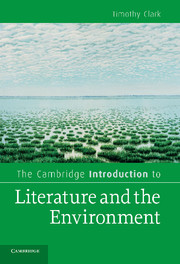Book contents
- Frontmatter
- Contents
- List of illustrations
- Preface
- Acknowledgements
- Introduction
- Romantic and anti-romantic
- The boundaries of the political
- Chapter 7 Thinking like a mountain?
- Chapter 8 Environmental justice and the move ‘beyond nature writing’
- Chapter 9 Two readings
- Chapter 10 Liberalism and green moralism
- Chapter 11 Ecofeminism
- Chapter 12 ‘Post-colonial’ ecojustice
- Chapter 13 Questions of scale
- Science and the struggle for intellectual authority
- The animal mirror
- Notes
- Further reading
- Index
- Cambridge Introductions to …
Chapter 12 - ‘Post-colonial’ ecojustice
Published online by Cambridge University Press: 05 June 2012
- Frontmatter
- Contents
- List of illustrations
- Preface
- Acknowledgements
- Introduction
- Romantic and anti-romantic
- The boundaries of the political
- Chapter 7 Thinking like a mountain?
- Chapter 8 Environmental justice and the move ‘beyond nature writing’
- Chapter 9 Two readings
- Chapter 10 Liberalism and green moralism
- Chapter 11 Ecofeminism
- Chapter 12 ‘Post-colonial’ ecojustice
- Chapter 13 Questions of scale
- Science and the struggle for intellectual authority
- The animal mirror
- Notes
- Further reading
- Index
- Cambridge Introductions to …
Summary
‘[T]here is no rush by African literary and cultural critics to adopt ecocriticism or the literature of the environment as they are promulgated from many of the world's metropolitan centers’ (William Slaymaker). Even writers ‘for whom “environmental” issues are central, such as the Nigerian poet Niyi Osundare, are still valued more in relation to more familiar social political issues’. A history often of war, dispossession, and colonial and neocolonial exploitation offers little space for an ecocriticism that has sometimes looked like the professionalised hobby of a western leisure class.
Nevertheless, it is in the so-called developing world that environmental disputes are at their most intense, most fraught with political, ethical and religious overtones and even violence. In contexts where international capitalism pits itself directly against traditional land use or where people may find themselves in the way of their own government's infrastructure schemes, fundamental questions are often immediately at issue about modes of life, human identity and social justice.
Environmentalism as neocolonialism?
In the encounter between ‘post-colonial’ thinking and ecocriticism to date, it is ecocriticism that first seems the more in need of revision. For, to many people, modern environmentalism can look like another form of colonialism. Critics will often now distance themselves in uneasy ways from the way reform environmentalism has become part of a system of global managerialism, closely related to institutions like the IMF or the World Bank, with its Global Environmental Facility.
- Type
- Chapter
- Information
- The Cambridge Introduction to Literature and the Environment , pp. 120 - 129Publisher: Cambridge University PressPrint publication year: 2011

